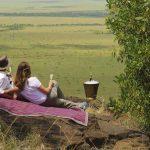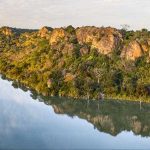As United States president Barack Obama visits Kenya, a month after the lifting of travel restrictions, one of our favourite stretches of African coastline is filled with new hope, finds Gill Charlton
Elton Munyore has been selling safari excursions to tourists on Bamburi beach, north of Mombasa, for 19 years. “The last year has been very difficult,” he says. “My family shamba [smallholding] gave us enough to eat, but nothing more. Fortunately I had some savings, but that’s all gone now.”
Along with every hotelier, boat captain and beach trader on Kenya’s coast, Munyore – known to everyone as Elton John, a nickname bestowed by British tourists years ago – breathed a huge sigh of relief when Britain last month lifted its ban on travel to Mombasa and the adjacent coast, from Watamu southward to the border with Tanzania.
“Before the advisory, six out of 10 of our guests were from Britain,” says Mohammed Hersi, CEO of Heritage Hotels, which runs Voyager, a popular all-inclusive resort on Nyali beach. “The entire community’s livelihood has been affected. It’s been a big wake-up call; now everyone knows what’s at stake. We need to make sure that what happened in Tunisia could never happen here.”
This weekend’s visit by Barack Obama to open the Global Entrepreneurship Summit is much talked-about on the beaches. For small-time salesmen such as Elton John, the arrival of the American president to promote young entrepreneurs can only be a good thing, a sign that there is international confidence in Kenya and its future in spite of the security issues.
Why you should travel to Kenya now
The Old Town of Mombasa
The British have visited the Kenyan coast in large numbers since the Eighties, drawn by the dazzling white sandy beaches, the friendly hotel staff, and the chance to spend a thrilling night or two on safari in the national parks of Tsavo and Amboseli.
Sharing a border with Somalia has always been problematic, however. In the past couple of years, extremists linked to the militant group Al Shabaab have carried out a number of attacks in Lamu and Tana River counties on the border with Somalia. As a result, the Foreign and Commonwealth Office still warns against all but essential travel to these areas and to within 60km (37 miles) of the Kenya-Somalia border.
Kenya’s coast reopens
In the wake of the sectarian violence, Britain and the United States have been providing military hardware and training as part of a raft of measures put in place by the Kenyan government to help secure the region. In coastal communities where the travel ban has been lifted, there is a renewed vigilance and a determination to preserve the open-minded tolerance for which the Swahili culture has long been known.
In his role as chairman of the Kenya Coast Tourism Association (KCTA), Mohammed Hersi has set up customer service and security training courses for beach traders all along the coast. “There’s no more ‘them’ and ‘us’,” says Hersi. “The curio sellers, masseurs and safari sellers are valuable extra eyes and ears on the beach and in the local community.” The KCTA has so far trained more than 500 of these beach operators (the term “beach boy” is no longer used) and it seems to be paying off in many ways.
As a single white female, I would normally have been mobbed walking alone on Bamburi beach. But after a gentle rebuttal to a man who tried to sell me a boat trip, and another who wanted to be my “friend”, I walked down the beach unmolested. Occasionally a curio seller called out, but there was a level of politeness on the beach that wasn’t there before. And the beach itself was a lot cleaner: the flotsam and jetsam dumped on Kenya’s beaches in summer by the Indian Ocean monsoon had been cleared up, even on stretches where there are no hotels.
Despite the big drop in revenues, the coast’s large resort hotels have been keeping up their maintenance programmes. The buildings are freshly whitewashed and the lawns and flower beds have been clipped and weeded to perfection. Necessary upgrading work has also continued, creating the more spacious bedrooms demanded by today’s holidaymakers.
Is it safe to travel to Kenya?
Whitesands, a collection of handsome low-rise buildings set in 22 acres, has undergone a major renovation to increase the size of its rooms and install swish contemporary bathrooms. On Saturday mornings the hotel allows the beach traders to set out their wares on its lawns. “It’s a new initiative,” says Joy Morai, the hotel’s sales manager. “It’s our thank you to them for making sure the beach is safe and clean.”
Like all hotels along the coast, Whitesands has visible, but unarmed, G4S security staff at its entrances from the road and the beach. This is nothing new, but now there are plain-clothes officers, too. Even so, the beach operators are the front-line troops. “We know everyone on this beach,” said Elton John. “We’re alert for intruders and we know what to do. The police have told us that it’s better to report something suspicious and get it wrong rather than let it go.”
It is hoped Obama’s visit will give an air of security to the country.
This was a mantra I heard from people up and down the coast. In Watamu, 70 miles north-east of Mombasa, they have tested the reporting system three times so far. “It worked really well,” said Damian Davies, manager of the Turtle Bay Beach Club, a popular budget choice with British families. “The police response was swift and efficient and, of course, they were all false alarms.”
Kenya’s most beautiful beach – in my view, one of the world’s best – is Diani, a long strand of soft white sand running south of Mombasa. The Foreign and Commonwealth Office advisory never included this area, as visitors could fly from Nairobi to Ukunda, the local airstrip, but it has suffered badly all the same.
A beginner’s guide to safari in Africa
This area was once a popular retreat for Britons living in Kenya, and many of their beach houses have been turned into smart boutique hotels. The Sands at Nomad, run by Richard Glaser, is something of an institution, serving up delicious fish and seafood fresh from the boats in its open-air beach dining room. He is optimistic about prospects for filling his 18 rooms over the winter season. “I’ve already signed contracts with Somak and Thomas Cook,” he said. “Thomson has come knocking too. It’s such a relief.”
Down on the beach, I was beckoned over by the curio sellers. They’d had their customer service training, but had it worked? “Please welcome. What is your name?” asked an older man wearing a big smile. “I will carve it on this wooden key-ring. It is a free gift and you can collect it tomorrow.”
It was a clever ruse, meaning I had to pay a second visit. The sellers speak good English; lengthy bargaining is required for the simplest purchase. It’s the custom, they told me. A discount of 50 per cent is usual.
I enjoyed talking to the beach operators, and finding out about their lives, but it’s not everyone’s cup of tea. For greater privacy, though, head south to where the metalled road runs out and the rural Africa of old reappears. The village of Msambweni is a delight. Traditional coral-stone houses line its grid of mud streets, which are also home to mango stalls and a great many hairdressers. Beyond the village lies Saruni Ocean, a new boutique hotel built in an attractive cuboid Swahili style. It is run by Luca De Marchis, a Roman chef, and his wife, Guilia, a marine biologist.
Over a lunch of carpaccio octopus and crab linguine, they told me that they had made a conscious decision to hire all the staff from the village. “It has taken a lot of training but we were determined to do it,” said De Marchis. “We need the villagers to see the benefits of helping us keep the beach clean and safe.”
Walking the beach here was an unfettered pleasure. An old lady watched a group of teenagers play football on the sand. In the shallows, younger boys were gutting eels and searching rock pools for more. At the reef’s edge, their fathers loaded nets into square-rigged dhows for the night’s fishing ahead. Occasionally I exchanged greetings: “Jambo”. “Habari”. “Nzuri sana asante”. I didn’t realise that beaches this unspoilt still existed in Kenya.
Back in Diani, I collected my key-ring. As I turned to leave, a man quietly asked if I would buy one of his bead necklaces. “Choose any one and just pay me KSh100,” he said. They’re worth more than 70p, but he was clearly desperate to make a sale.
“Why the bargain?” I asked.
“I just need to sell something. To feel good. To believe that things are going to get better again.”
Where to stay
All package prices quoted below are per person for one week including flights from Britain, unless otherwise stated. Most hotels have extensive spas, watersports facilities plus diving and snorkelling on protected reefs.
South of Mombasa
??The Sands at Nomad
Thirty-seven rooms, including two-bedroom suites and beach cottages, on the loveliest stretch of Diani. Superb restaurant and sociable bar popular with expats. From £770 b & b; child sharing £539 (thesandskenya.com).
??Leopard Beach Resort
Set in 37 acres on a small bluff above two small coves north of Diani. Bright spacious rooms and new villas (the Residences) with a choice of places to eat. Adults-only pool and beach as well as family entertainment and pool areas. From £835 half-board; child sharing £699
A room at the Saruni Ocean Resort
??Kinondo Kwetu
A family home turned boutique retreat run by the Andersson family from Sweden. The 15 rooms are arranged in villas filled with antique pieces beside a private beach. Horse-riding and tennis on site with tuition. From £2,819 all inclusive; child sharing £1,899 (kinondo-kwetu.com).
??Saruni Ocean
A stylish contemporary hideaway with 10 suites, a large infinity pool and fine dining under the stars. Charming Italian hosts speak English. From £2,055 full-board; child sharing £1,179 (saruni.com).
North of Mombasa
??Whitesands Beach Resort
Stylish sea view rooms and suites renovated over the past three years. Well run by a very friendly, efficient team. From £845 half-board; child sharing £765 (sarovahotels.com).
??Voyager Beach Resort
The best family-oriented resort on the coast and a big favourite with Brits: spotless rooms, professional kids club, beautiful gardens, themed buffets and entertainment. From £900 all inclusive; child sharing £599 (heritage-eastafrica.com).
??Serena Beach Resort
Set in beautiful grounds by a quiet 1.2-mile beach bounded by cliffs. Intimate despite its 164 rooms: many recently enlarged with new bathrooms to create more space. Its Elemis spa is the best on the coast. From £1,025 half-board; child sharing £699 (serenahotels.com).
??Travellers Beach Hotel
A great three-star option with a particularly welcoming atmosphere. Good air-conditioned gym. From £690 half-board; child sharing £599 (travellersbeach.com).
Watamu
??Medina Palms
While Watamu’s leading hotel, Hemingways, remains closed the neighbouring Medina Palms is the luxury alternative: one-bedroom apartment sleeping two from £210 per night half-board (medinapalms.com).
??Turtle Bay Beach Club
The oldest all-inclusive on the coast, it has loyal repeat customers and good food, though rooms are looking a little tired. From £975 all-inclusive; child sharing £599 (turtlebaykenya.com).
??Shwari House
Fully staffed beachfront villa with six en suite bedrooms and infinity pool. Rents for £700 per night






